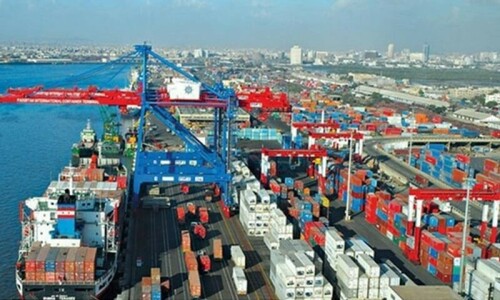WASHINGTON: The International Monetary Fund (IMF) on Tuesday called for establishing a policy framework and environment that promote financial stability and sound development of Islamic banking.
The guidelines, released by the IMF headquarters in Washington, noted that it was particularly to develop such a framework in the countries where Islamic banking has become systemically important.
On Feb 3, the IMF Executive Board held its first formal discussion on Islamic banking and adopted a set of proposals on the role that the Fund should play in this area.
The IMF noted Islamic banking continues to grow rapidly, in size and complexity, contributing to financial deepening and inclusion in many countries but this growth also poses a challenge to supervisory authorities and central banks.
While accounting for a small share of global financial assets, Islamic banking has established a presence in more than 60 countries and has become systemically important in 14 jurisdictions. Islamic banking involves operations, balance sheet structures, and risks that differ from their conventional banking counterparts.
“There is a need for putting in place an environment that promotes Islamic banking financial stability and sound development, including legal, prudential, financial safety nets, anti-money laundering and countering the financing of terrorism, and liquidity management frameworks,” said a paper the IMF released in Washington.
The IMF has been providing technical advice to member countries on Islamic banking issues for the past 20 years and has been cooperating with relevant standards setters and international organisations on efforts to develop supplementary standards for Islamic banking in areas that are not covered by existing international standards.
In recent years, the number and complexity of Islamic banking issues arising during IMF country surveillance and the demand for policy advice and capacity development in this area have increased and the IMF feels that this requires a more formal involvement.
The IMF executive Directors concurred that Islamic banking presents an opportunity for many member countries to enhance financial intermediation and inclusion and mobilise funding for economic development. At the same time, they noted that the growth of Islamic banking and its complexities pose new challenges and unique risks for regulatory and supervisory authorities.
Against this background, directors expressed support for staffs proposed approach to developing and providing policy advice on Islamic banking-related issues in the context of fund surveillance, programme design, and capacity development activities. They also called for staff’s continued support to the work of the relevant international standard setters and other international bodies to help address current gaps in the international regulatory framework for Islamic banking.
Directors saw merit in considering a proposal to formally recognise the “Core Principles for Islamic Finance Regulation for Banking,” prepared by the Islamic Financial Services Board, as a standard under the Fund/Bank Standards and Codes Initiative. They will receive a formal proposal for the executive board endorsement before end-April 2018.
The IMF welcomed the progress that has been made in developing legal and governance frameworks, and regulatory and supervisory standards for Islamic banking, to complement the international norms and standards that apply beyond Islamic banks.
Building on the progress made, the IMF called for full implementation and consistent application of the standards, and for strengthening supervisory capacity with respect to Islamic banking.
The IMF emphasised the importance of having in place robust Islamic banking-specific resolution regimes and other financial safety nets for countries in which Islamic banking operates.
Noting the slow progress achieved in these areas, IMF directors underscored the importance of additional work in collaboration with relevant international bodies on the design of legal regimes and institutional arrangements for effective Islamic banking resolution, deposit insurance schemes and of adapting the conventional lender-of-last-resort framework to cover Islamic banking.
The directors agreed that the availability of high-quality liquid assets for Islamic banking is important for effective liquidity management and financial stability, and for the sustainable development of the Islamic banking industry.
In this context, they called for increased efforts to deepen the government sukuk markets. The directors also noted the importance of having in place relevant central banking liquidity facilities and instruments.
Published in Dawn, February 22nd, 2017














































Dear visitor, the comments section is undergoing an overhaul and will return soon.